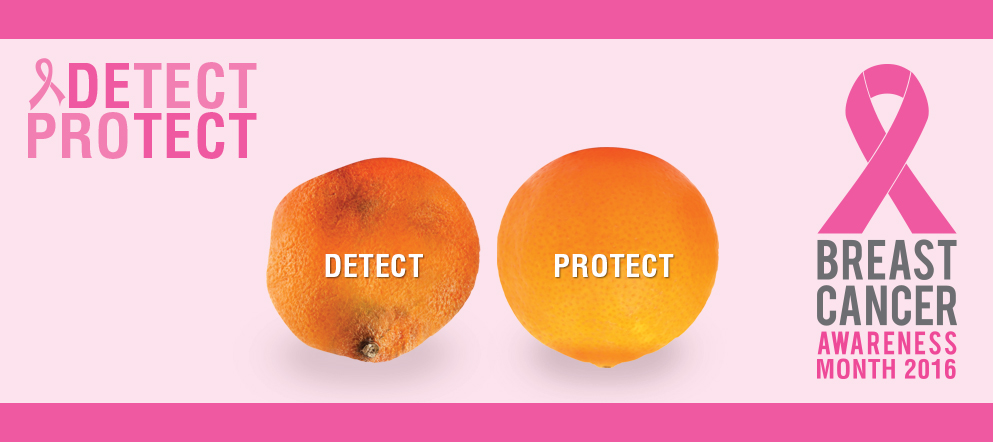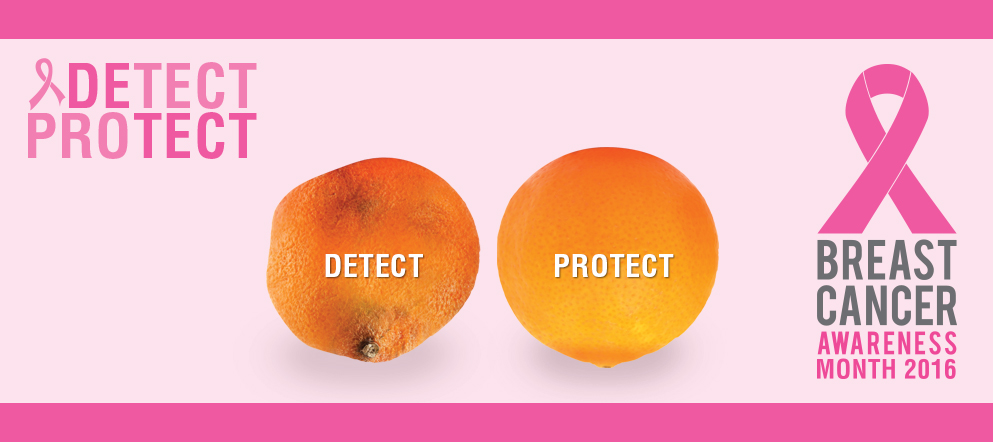
October is Breast Cancer Awareness Month, which is an annual campaign to increase awareness of the disease. While most people are aware of breast cancer, many forget to take the steps to have a plan to detect the disease in its early stages and encourage others to do the same.
Know the symptoms of breast cancer
Early breast cancer usually doesn’t cause symptoms. But as the tumor grows, it can change how the breast looks or feels.
- A lump or thickening in or near the breast or in the underarm area
- A change in the size or shape of the breast
- Dimpling or puckering in the skin of the breast
- A nipple turned inward into the breast
- Discharge (fluid) from the nipple, especially if it’s bloody
- Scaly, red, or swollen skin on the breast or nipple
- The skin may have pitting so that it looks like an orange
These symptoms do not automatically indicate breast cancer. But, if you have any of these conditions, you should tell your health care provider so that the problems can be diagnosed and treated.
Knowing Your Body:
For women under 50-years old:
- Employ annual clinical breast examinations and monthly breast self-examinations as your primary early detection protocol.
- Once a year, every year, without fail, schedule an appointment with your healthcare provider to perform a clinical breast examination. We recommend you schedule it on or near your birthday.
- Once a month, every month, without fail, set aside 15 minutes to conduct thorough breast self-examination. We recommend you schedule it on the first day of menstruation.
- Schedule a mammogram only if needed for diagnosis of a suspected lump. Even then, be sure to schedule that mammogram within the first 14 days of your menstrual cycle.
For women over 50-years old:
- Employ annual clinical breast examinations and monthly breast self-examinations as your primary early detection protocol.
- Once a year, every year, without fail, schedule an appointment with your healthcare provider to perform a clinical breast examination. We recommend you schedule it on or near your birthday.
- Once a month, every month, without fail, set aside 15 minutes to conduct a thorough breast self-examination. We recommend you schedule it on the first day of your period if you are still menstruating.
- Schedule a mammogram if you discover a lump. Even then, be sure to schedule that mammogram within the first 14 days of your menstrual cycle if you are still menstruating.
- Employ mammography screening every other year.
Steps to help you respond with maximum intelligence to this diagnosis and help you rebuild your self-healing functions.
The basic action points are:
- Step back from the day-to-day pressures of your life to evaluate your current situation in its entirety.
- Assess both current life issues that must be changed as well as future needs that must be met.
- Create a simple plan to restore health and total well-being.
- Work in partnership with health advisors who have your confidence. Begin a self-care plan to create whole-person well-being.
- Conduct quarterly reviews of your progress, making adjustments as necessary.
Taken together, these action points will play the central role in mobilizing all your healing options and capacities, both external and internal.
The Breast Cancer Prevention Lifestyle
Yes, you can maximize your potential for actually preventing breast cancer! It’s all about personal choices in how we take care of ourselves.
American Cancer Society Releases New Breast Cancer Guideline – The new recommendations are :
- Women with an average risk of breast cancer – most women – should begin yearly mammograms at age 45.
- Women should be able to start the screening as early as age 40, if they want to. It’s a good idea to start talking to your health care provider at age 40 about when you should begin screening.
- At age 55, women should have mammograms every other year – though women who want to keep having yearly mammograms should be able to do so.
- Regular mammograms should continue for as long as a woman is in good health.
- Breast exams, either from a medical provider or self-exams, are no longer recommended.
The guidelines are for women at average risk for breast cancer. Women at high risk – because of family history, a breast condition, or another reason – need to begin screening earlier and/or more often. Talk to your medical provider to be sure.
